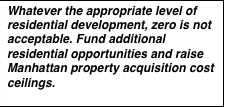Housing: In 2015 there were no new certified residential opportunities in Manhattan, meaning all placements in Manhattan were made to ‘backfill’ placement in existing homes. Such occasions are usually the result of a resident death or move to nursing care owing to age or chronic illness.  OPWDD’s Manhattan office reports 34 placements in 2015. The registration list of those requesting placement from Manhattan was recently reported as 491. Property acquisition purchase and rental cost ceilings set by the state and available housing subsidy for individuals who can live in uncertified settings are far too low to secure safe, stable and accessible housing in Manhattan, where the high-priced market is an ongoing challenge. No system can rely on fiscal support so far below market rates and without effective engagement with affordable and supportive housing opportunities.
OPWDD’s Manhattan office reports 34 placements in 2015. The registration list of those requesting placement from Manhattan was recently reported as 491. Property acquisition purchase and rental cost ceilings set by the state and available housing subsidy for individuals who can live in uncertified settings are far too low to secure safe, stable and accessible housing in Manhattan, where the high-priced market is an ongoing challenge. No system can rely on fiscal support so far below market rates and without effective engagement with affordable and supportive housing opportunities.
Inadequacy of Funding for New Services: $120 million in the Executive Budget is for new program opportunities and is said to be sufficient for 6,000 eligible new persons or those moving from school to adult services. This provides approximately $20,000 per year per person, while per capita Home and Community Based Services have averaged $70,000/year. The allocation also includes an estimated 200 individuals aging-out from residential schools, for whom typical total annual care costs are $150,000, taking up $30 million. Others in need of adult programs are a far larger group, but many of them also have complex needs equivalent to residential school graduates. The budget proposal is woefully inadequate to meet projected service needs.
Redesign of Self-Direction: Self-Direction is a service option for eligible participants that enables self-management of their supports, and allows for more choice, improved community integration, and robust person-centered outcomes. But a deep reduction in payments to the required Fiscal  Intermediary (FI) agency has not been addressed, even though some agencies providing this service have suspended new business in order to limit their financial exposure. The FI is an essential component in making Self-Direction a workable option for individuals. New procedures taking effect this month further increase the FI share of work. Moreover, allocations for self-directed budgets for residential and other services are inadequate for people with intensive support needs. No method for appealing adverse budget decisions has been announced, and if the matter is not resolved in 60 days such items are no longer reimbursable.
Intermediary (FI) agency has not been addressed, even though some agencies providing this service have suspended new business in order to limit their financial exposure. The FI is an essential component in making Self-Direction a workable option for individuals. New procedures taking effect this month further increase the FI share of work. Moreover, allocations for self-directed budgets for residential and other services are inadequate for people with intensive support needs. No method for appealing adverse budget decisions has been announced, and if the matter is not resolved in 60 days such items are no longer reimbursable.
Families and individuals without time, home office capacity, and robust social networks cannot effectively manage the demands of Self-Direction. They must have the ability to advance many expenses, transmit timely paperwork, and recruit, train and now evaluate paid staff. Many of those who had established and successful plans prior to the October 2014 ‘reinvention’ report that new regulations don’t fit their longstanding plans.
Managed Care Infrastructure: Multi-billion dollar investments that are available to hospital and other health care providers around the state to prepare for Value Based Payments and managed  care are not meaningfully available to I/DD providers. OPWDD has set in motion a Transformation Agenda, yet there are no investments to drive the innovation, system reform, acquisition of technology and efficiencies needed for success in managed care.
care are not meaningfully available to I/DD providers. OPWDD has set in motion a Transformation Agenda, yet there are no investments to drive the innovation, system reform, acquisition of technology and efficiencies needed for success in managed care.
Implementation of Transformation Agenda: The Transformation Panel Final Report expresses worthy aspirations in the recommendations, but remains unacceptably vague with respect to implementation. We look forward to seeing timetables, targets, and funding for the objectives stated.
